The Fountain
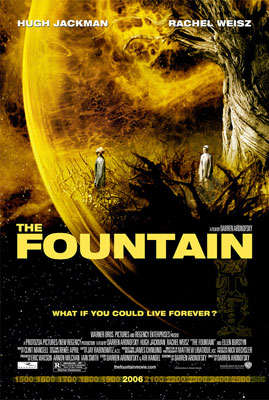
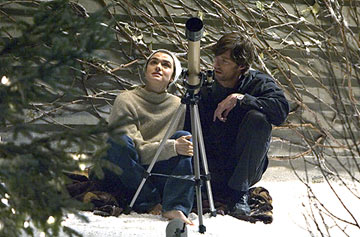 The Fountain's grand plot covers three separate storylines set thousands of years apart, yet all set around the ideas of death, loss, and the desire to live forever. The main storyline is set in the present day, and centers around a doctor named Tom (Hugh Jackman) who is obsessed over developing a cure that can not only slow down the aging process, but remove a deadly tumor. There is a personal reason behind his obsession, as his beloved wife Izzi (Rachel Weisz) is starting to show the drastic later signs of a terminal illness she has been struggling with for years. Over the past couple years, Izzi has been working on a book that tells the story of a Spanish conquistador in the 16th Century, and his quest for the Tree of Life for Queen Isabel so that they can both obtain eternal life. As Tom reads Izzi's book, we witness the story come to life with Hugh Jackman playing the conquistador, and Rachel Weisz as the Queen. The third and final storyline is set in the distant future, and focuses on a lone traveler (Hugh Jackman once again) floating through space in a bubble with the withering Tree of Life in search of a nebula that can help both him and the mythical tree.
The Fountain's grand plot covers three separate storylines set thousands of years apart, yet all set around the ideas of death, loss, and the desire to live forever. The main storyline is set in the present day, and centers around a doctor named Tom (Hugh Jackman) who is obsessed over developing a cure that can not only slow down the aging process, but remove a deadly tumor. There is a personal reason behind his obsession, as his beloved wife Izzi (Rachel Weisz) is starting to show the drastic later signs of a terminal illness she has been struggling with for years. Over the past couple years, Izzi has been working on a book that tells the story of a Spanish conquistador in the 16th Century, and his quest for the Tree of Life for Queen Isabel so that they can both obtain eternal life. As Tom reads Izzi's book, we witness the story come to life with Hugh Jackman playing the conquistador, and Rachel Weisz as the Queen. The third and final storyline is set in the distant future, and focuses on a lone traveler (Hugh Jackman once again) floating through space in a bubble with the withering Tree of Life in search of a nebula that can help both him and the mythical tree.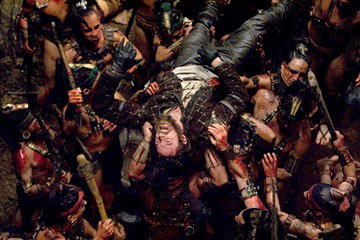 One watches The Fountain, and wonders how a movie like this was able to be sold to a major studio like Warner Bros. This is an extremely downbeat, perplexing, and sometimes poetic sci-fi meditation on man's obsession with cheating death. The project has actually been in production for years, and was originally conceived as a $75 million blockbuster with Brad Pitt in the male lead role. When Pitt and director Aronofsky could not see eye to eye, the project was shelved, and Aronofsky went back to the drawing board, completely re-writing the script to fit a still healthy, but much more modest, budget of $35 million. I really wish I could read the original script and see just what could have convinced a studio to put this much money toward such a polarizing movie. That being said, those who are willing to unlock the enigma that this movie provides are sure to be rewarded. The film is deep, compelling, and often tragic. Earlier, I referred to the film as a sci-fi meditation on man's obsession with cheating death. At times, that's certainly what the movie seems to be. The film is leisurely paced, though never boring, and very slowly unravels its mystery upon the viewer. This movie is a journey into our fears about death and mortality, and although it is often heavy and downbeat, it never becomes overbearing or so depressing that you want to stop watching. This is a good thing, as there are really no "light" moments at any time in The Fountain. Some people have accused the screenplay of being heavy handed or overly melodramatic, but I thought the tone was perfect for the kind of story that Aronofsky was trying to tell, and was able to hold onto the human aspects of the characters, so that the emotion of the piece was able to ring out.
One watches The Fountain, and wonders how a movie like this was able to be sold to a major studio like Warner Bros. This is an extremely downbeat, perplexing, and sometimes poetic sci-fi meditation on man's obsession with cheating death. The project has actually been in production for years, and was originally conceived as a $75 million blockbuster with Brad Pitt in the male lead role. When Pitt and director Aronofsky could not see eye to eye, the project was shelved, and Aronofsky went back to the drawing board, completely re-writing the script to fit a still healthy, but much more modest, budget of $35 million. I really wish I could read the original script and see just what could have convinced a studio to put this much money toward such a polarizing movie. That being said, those who are willing to unlock the enigma that this movie provides are sure to be rewarded. The film is deep, compelling, and often tragic. Earlier, I referred to the film as a sci-fi meditation on man's obsession with cheating death. At times, that's certainly what the movie seems to be. The film is leisurely paced, though never boring, and very slowly unravels its mystery upon the viewer. This movie is a journey into our fears about death and mortality, and although it is often heavy and downbeat, it never becomes overbearing or so depressing that you want to stop watching. This is a good thing, as there are really no "light" moments at any time in The Fountain. Some people have accused the screenplay of being heavy handed or overly melodramatic, but I thought the tone was perfect for the kind of story that Aronofsky was trying to tell, and was able to hold onto the human aspects of the characters, so that the emotion of the piece was able to ring out.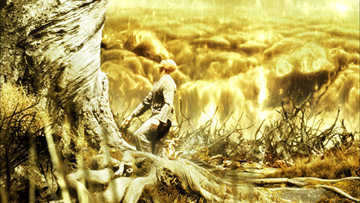 This is thanks mostly to the wonderful lead performances of Hugh Jackman and Rachel Weisz. In each of their multiple roles throughout the film, they are able to completely transform themselves, and are up to just about any challenge that the screenplay throws at them. Hugh Jackman, in particular, has the hardest role, as he must not only play three separate characters, but his characters must carry each of the multiple storylines. Having appeared in a grand total of four very different films in less than three months (his others being The Prestige, Flushed Away, and Happy Feet), Jackman has proved that he is willing to pursue a wide variety of projects, and that he is more than capable of handling just about any kind of character. Rachel Weisz is able to avoid most of the pitfalls that lesser actresses fall into when they play dying characters in her main role. She plays Izzi as a woman who has come to peace with what she knows will happen, and is simply trying to enjoy her final moments, never feeling sad or weeping over her fate. Even though we learn very little about Tom and Izzi's relationship in the central storyline, they still come across as a genuine couple, and we can sense the love between them. In the supporting performances, Ellen Burstyn is a strong presence as a woman who understands Tom's obsession to find a cure, but is at the same time frightened by it.
This is thanks mostly to the wonderful lead performances of Hugh Jackman and Rachel Weisz. In each of their multiple roles throughout the film, they are able to completely transform themselves, and are up to just about any challenge that the screenplay throws at them. Hugh Jackman, in particular, has the hardest role, as he must not only play three separate characters, but his characters must carry each of the multiple storylines. Having appeared in a grand total of four very different films in less than three months (his others being The Prestige, Flushed Away, and Happy Feet), Jackman has proved that he is willing to pursue a wide variety of projects, and that he is more than capable of handling just about any kind of character. Rachel Weisz is able to avoid most of the pitfalls that lesser actresses fall into when they play dying characters in her main role. She plays Izzi as a woman who has come to peace with what she knows will happen, and is simply trying to enjoy her final moments, never feeling sad or weeping over her fate. Even though we learn very little about Tom and Izzi's relationship in the central storyline, they still come across as a genuine couple, and we can sense the love between them. In the supporting performances, Ellen Burstyn is a strong presence as a woman who understands Tom's obsession to find a cure, but is at the same time frightened by it.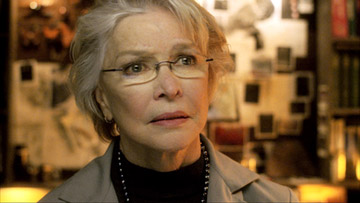 More so than the performances, it is the movie itself that makes The Fountain a filmgoing experience unlike any you most likely have ever had, or ever will have again in the near future. It is not just the ambitious and sometimes poetic storytelling, but the visual and technical sense that carries throughout it. The film is a constant visual wonder as it switches back and forth through its three separate time periods, making it seem as if we were watching three entirely different films. This is not a distraction, but a plus, as the three distinct styles of the storylines complement each other beautifully. The experience is further enhanced with some amazing special effects work that I was surprised to learn was not created with the use of computers. The special effects imagery during the sequences set in the future are awe-inspiring, and deserve to be seen on the big screen. To top it all off, there is the beautiful music score by Clint Mansell. The score is fairly minimalist and simple, a vast difference to how grand everything else about this movie is, but it fits perfectly with the imagery, and I can't imagine the movie without it. This is the rare film where everything behind the camera is able to enhance what you are watching on the screen, and you can truly see where the time, money, and energy went into the making of the film.
More so than the performances, it is the movie itself that makes The Fountain a filmgoing experience unlike any you most likely have ever had, or ever will have again in the near future. It is not just the ambitious and sometimes poetic storytelling, but the visual and technical sense that carries throughout it. The film is a constant visual wonder as it switches back and forth through its three separate time periods, making it seem as if we were watching three entirely different films. This is not a distraction, but a plus, as the three distinct styles of the storylines complement each other beautifully. The experience is further enhanced with some amazing special effects work that I was surprised to learn was not created with the use of computers. The special effects imagery during the sequences set in the future are awe-inspiring, and deserve to be seen on the big screen. To top it all off, there is the beautiful music score by Clint Mansell. The score is fairly minimalist and simple, a vast difference to how grand everything else about this movie is, but it fits perfectly with the imagery, and I can't imagine the movie without it. This is the rare film where everything behind the camera is able to enhance what you are watching on the screen, and you can truly see where the time, money, and energy went into the making of the film.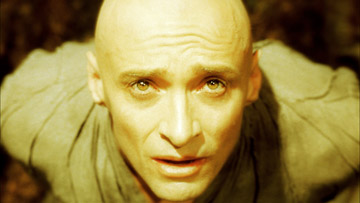
I am recommending The Fountain, because I enjoyed it. Your enjoyment, I feel, may vary differently from mine. This movie is most certainly not a crowd pleaser, and will most likely frustrate more than a few people. Those of you who are looking for some escapism or light entertainment should not even dream of dropping their money down on this one. But, if you want a challenging movie that is actually able to satisfy, and satisfy even more as you think back on it, I can think of few films that do it better than this. Love it or hate it, it's very unlikely you will forget The Fountain anytime soon. With so many movies content to fade from your mind the second you walk out the theater doors, that's something special indeed.
See the movie times in your area or buy the DVD at Amazon.com!






0 Comments:
Post a Comment
<< Home